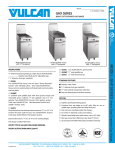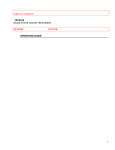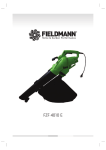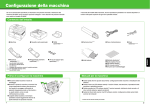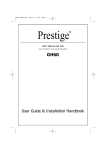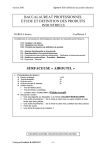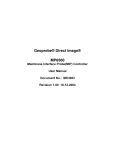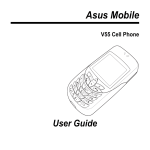Download Vulcan-Hart GHM60T Service manual
Transcript
SERVICE MANUAL GH SERIES HEAVY DUTY GAS RANGES MODELS GH30 GH45 GH53/72 GH56 GH60 GH60T GH70 GH72/45 GH45/72 GH60/45 GH60T45 GH60/72 GH60T72 GHM30 GHM45 GHM5372 GHM56 GHM60 GHM60T GHM72 GHM7245 GHM4572 GHM6045 GHM60T/45 GHM6072 GHM60T/72 GHX45 GHX60 GHX60T GHXM45 GHXM60 GHMX60T GHX72 GHXM72 ML-52141 ML-52142 ML-52173 ML-52143 ML-52144 ML-52171 ML-52145 ML-52176 ML-52180 ML-52174 ML-52186 ML-52175 ML-52188 ML-52151 ML-52152 ML-52195 ML-52153 ML-52154 ML-52172 ML-52155 ML-52179 ML-52181 ML-52177 ML-52187 ML-52178 ML-52189 ML-52217 ML-52218 ML-52223 ML-52220 ML-52221 ML-52224 ML-52219 ML-52222 VULCAN-HART COMPANY, P.O. BOX 696, LOUISVILLE, KY 40201- 0696, TEL. (502) 778-2791 FORM 30848 Rev. A (9-98) IMPORTANT FOR YOUR SAFETY THIS MANUAL HAS BEEN PREPARED FOR PERSONNEL QUALIFIED TO INSTALL GAS EQUIPMENT, WHO SHOULD PERFORM THE INITIAL FIELD START-UP AND ADJUSTMENTS OF THE EQUIPMENT COVERED BY THIS MANUAL. POST IN A PROMINENT LOCATION THE INSTRUCTIONS TO BE FOLLOWED IN THE EVENT THE SMELL OF GAS IS DETECTED. THIS INFORMATION CAN BE OBTAINED FROM THE LOCAL GAS SUPPLIER. IMPORTANT IN THE EVENT A GAS ODOR IS DETECTED, SHUT DOWN UNITS AT MAIN SHUTOFF VALVE AND CONTACT THE LOCAL GAS COMPANY OR GAS SUPPLIER FOR SERVICE. FOR YOUR SAFETY DO NOT STORE OR USE GASOLINE OR OTHER FLAMMABLE VAPORS OR LIQUIDS IN THE VICINITY OF THIS OR ANY OTHER APPLIANCE. WARNING IMPROPER INSTALLATION, ADJUSTMENT, ALTERATION OR MODIFICATION, SERVICE OR MAINTENANCE CAN CAUSE PROPERTY DAMAGE, INJURY OR DEATH. READ THE INSTALLATION, OPERATING AND MAINTENANCE INSTRUCTIONS THOROUGHLY BEFORE INSTALLING OR SERVICING THIS EQUIPMENT. IN THE EVENT OF A POWER FAILURE, DO NOT ATTEMPT TO OPERATE THIS DEVICE. -2- TABLE OF CONTENTS PAGE CONFIGURATIONS OF MODEL GH SERIES HEAVY DUTY RANGES . . . . . . . . . . . . . . . . . . . . 4 GENERAL. . . . . . . . . . . . . . . . . . . . . . . . . . . . . . . . . . . . . . . . . . . . . . . . . . . . . . . . . . . . . . . . . . . . . . 8 TROUBLESHOOTING . . . . . . . . . . . . . . . . . . . . . . . . . . . . . . . . . . . . . . . . . . . . . . . . . . . . . . . . . . . . 8 LIGHTING AND SHUTTING DOWN PILOTS . . . . . . . . . . . . . . . . . . . . . . . . . . . . . . . . . . . . . . . . . 10 Open Top, Griddle Top and Hot Top Burner Pilots . . . . . . . . . . . . . . . . . . . . . . . . . . . . . . . . . 10 Standard Oven Pilot . . . . . . . . . . . . . . . . . . . . . . . . . . . . . . . . . . . . . . . . . . . . . . . . . . . . . . . . . . 10 Convection Oven Pilot . . . . . . . . . . . . . . . . . . . . . . . . . . . . . . . . . . . . . . . . . . . . . . . . . . . . . . . . 11 SERVICE . . . . . . . . . . . . . . . . . . . . . . . . . . . . . . . . . . . . . . . . . . . . . . . . . . . . . . . . . . . . . . . . . . . . . 11 Pilot Burner Adjustments . . . . . . . . . . . . . . . . . . . . . . . . . . . . . . . . . . . . . . . . . . . . . . . . . . . . . . 11 Open Top Burner Pilot Adjustments . . . . . . . . . . . . . . . . . . . . . . . . . . . . . . . . . . . . . . . . . . . . . 12 Hot Top and Griddle Top Pilot Adjustments . . . . . . . . . . . . . . . . . . . . . . . . . . . . . . . . . . . . . . . 12 Oven Adjustments . . . . . . . . . . . . . . . . . . . . . . . . . . . . . . . . . . . . . . . . . . . . . . . . . . . . . . . . . . . 12 TEMPERATURE CONTROL RECALIBRATION . . . . . . . . . . . . . . . . . . . . . . . . . . . . . . . . . . . . . . 13 Standard Oven . . . . . . . . . . . . . . . . . . . . . . . . . . . . . . . . . . . . . . . . . . . . . . . . . . . . . . . . . . . . . . 13 Convection Oven . . . . . . . . . . . . . . . . . . . . . . . . . . . . . . . . . . . . . . . . . . . . . . . . . . . . . . . . . . . . 14 AUTOMATIC SHUTOFF PILOT INSTRUCTIONS . . . . . . . . . . . . . . . . . . . . . . . . . . . . . . . . . . . . . 15 Cleaning . . . . . . . . . . . . . . . . . . . . . . . . . . . . . . . . . . . . . . . . . . . . . . . . . . . . . . . . . . . . . . . . . . . 15 Service Instructions . . . . . . . . . . . . . . . . . . . . . . . . . . . . . . . . . . . . . . . . . . . . . . . . . . . . . . . . . . 15 Thermostatically Controlled Griddle Recalibration . . . . . . . . . . . . . . . . . . . . . . . . . . . . . . . . . 16 -3- CONFIGURATIONS OF MODEL GH SERIES HEAVY DUTY RANGES WITH STANDARD AND CONVECTION OVENS GH45 GH30 GH72 GH56 GH53/72 GH45 FULL BODY 34" WIDE GH72/45 GH60/GH60T GH45/72 GH60/72/GH60T72 -4- PL-51241 GH60/45/GH60T/45 CONFIGURATIONS OF MODEL GH SERIES HEAVY DUTY MODULAR RANGES GHM45 GHM30 GHM72 GHM56 GHM53/72 GHM45 GHM72/45 GHM60 GHM60T GHM45/72 GHM60/72 GHM60T/72 -5- PL-51276 GHM60/45 GHM60T/45 CONFIGURATIONS OF MODEL GH SERIES HEAVY DUTY EXPANDO RANGES MODEL GHX SERIES EXPANDO RANGES WITH CABINET GHX45 GHX60 GHX60T GHX72 GHX45 18" WIDE FULL BODY WITH CABINET MODEL GHXM SERIES MODULAR EXPANDO RANGES GHXM45 GHXM60 GHXM60T GHXM72 PL-51242 GHXM45 -6- CONFIGURATIONS OF GH SERIES HEAVY DUTY OVENS GHO1 SINGLE OVEN WORK TOP VIEW GHO1C SINGLE CONVECTION OVEN GHMO1 ON MODULAR STAND PL-51243 GHO2 DOUBLE STACKED OVEN -7- SERVICE MANUAL MODEL GH SERIES HEAVY DUTY GAS RANGES KEEP THIS MANUAL FOR FUTURE REFERENCE GENERAL Vulcan ranges and ovens are produced with quality workmanship and material. Proper installation, usage and maintenance of your range will result in many years of satisfactory performance. The manufacturer suggests that you thoroughly read this entire manual and carefully follow all of the instructions provided. A rating plate is located on the lower left-hand corner of the front frame behind the bellcrank. The rating plate states the model number, serial number and type of gas the range requires. Motors in Vulcan convection ovens are permanently lubricated and require no additional maintenance. Should it be necessary to disconnect the gas line strain relief at the rear of the range in order to perform service procedures, turn off the gas supply before disconnection. Reconnect the strain relief before turning the gas supply on and returning the range(s) to their installation position. TROUBLESHOOTING TOP BURNER OPERATION PROBLEM PROBABLE CAUSES Improper Burner Combustion Excessive Valve Handle Temperatures Sticking Top Burner Valves Improper use, allowing improper ventilation. Poor door fit. Oven door left open. Poor Ignition Insufficient gas input. Poor air-to-gas adjustment. Restriction in pilot orifice. Restriction in main burner ignition port. Restriction in control valve. Restriction in gas orifice. -8- OVEN PROBLEM PROBABLE CAUSES Too Much Bottom Heat. Insufficient heat input. Overactive flue. Too low temperature. Improper operation. Improper bypass setting Fluctuating gas pressure. Uneven Bake Side Burning Too Much Top Heat Too high temperature. Faulty ventilation. Excessive heat input. Thermostat needs calibration. Uneven Bake - Side to Side Range not level side to side. Oven burner, bottom or baffles improperly installed. Pulling to Edge of Pan Warped pans. Oven not level. Uneven Bake - Front to Rear Overactive flue. Range not level front to back. Door not closing properly. Dried Out Products Too low temperature. Too long baking time. Thermostat calibration. Pilot Outage Gas supply not sufficient. Pilot flame too low. Restriction in pilot orifice. Malfunctioning check valve. CONVECTION OVEN MODELS ONLY: Cavity leaking. Gasket problems. Snorkel tube blocked. Blower running backwards. Excessive Meat Shrinkage Roasting temperature too high. -9- LIGHTING AND SHUTTING DOWN PILOTS OPEN TOP, GRIDDLE TOP AND HOT TOP BURNER PILOTS 1. Turn main gas supply ON. 2. Turn all top burner valve knobs ON to purge gas line of air. 3. Turn top burner valve knobs OFF. 4. Wait 30 seconds. 5. Using a taper, light the pilot(s). 6. If pilot fails to light, wait 5 minutes and repeat Steps 1 through 5. 7. Turn one top burner valve ON to ensure that all gas lines are completely purged of air. Turn burner OFF when gas begins to flow. Nightly Shutdown: Turn burner valve OFF; pilot will remain lit. Complete Shutdown: Turn burner valve OFF; pilot will remain lit. Turn main gas valve OFF. STANDARD OVEN PILOT Before lighting oven, be sure that range top sections have been lit. 1. Open oven door and locate square pilot lighter cutout. 2. Using a taper, light oven pilot by depressing red ignition button (Fig.1) located on the side control panel above the thermostat knob. Light pilot and continue to hold ignition button in for one minute. If pilot fails to light, turn main gas valve OFF and wait 5 minutes before repeating Steps 1 and 2. 3. Set oven thermostat to desired temperature. PL-40052 Fig. 1 - 10 - Nightly Shutdown: Turn oven burner valve OFF. Complete Shutdown: Turn oven burner valve OFF. Turn main gas supply OFF. CONVECTION OVEN PILOT Before lighting oven, be sure that range top sections have been lit. 1. Connect range to the main electrical supply line. Open oven door panel and locate square pilot lighter cutout. 2. Turn red gas valve (located behind the control panel) ON, purging the gas line of all air. Turn gas valve and power switch OFF. Close oven door. 3. Light oven pilot by depressing the red ignition button (see Fig. 1), and using a taper, ignite the pilot. Hold ignition button in for 30 seconds, or until pilot remains lit. Turn gas valve back ON. 4. If pilot fails to light, turn main gas valve OFF. Wait 5 minutes and repeat Steps 2 and 3. 5. After pilot is lit, push the power switch ON and turn the temperature dial to the desired setting. Nightly Shutdown: Turn power switch OFF and the temperature dial to 0 degrees. Complete Shutdown: 1. Push power switch OFF. 2. Turn red gas valve (located behind the control panel) OFF. 3. Turn main gas supply OFF. 4. Disconnect electrical supply cord. SERVICE WARNING: THE RANGE AND ITS PARTS ARE HOT. BE CAREFUL WHEN OPERATING, CLEANING OR SERVICING THE RANGE. Pilot Burner Adjustments All adjustment procedures associated with pilot lighting are to be performed by an authorized VulcanHart installation or service person. After adjustments are complete, replace oven control panel(s). Check identification so that each panel is returned to its respective range. Replace oven baffles and oven bottom(s). Replace upper manifold panel(s). Position brick in ranges where necessary. Replace top casting(s). Check identification so that each may be returned to its respective original range as received from the factory. - 11 - Open Top Burner Pilot Adjustments Tools: Standard screwdriver. After pilot is lit, turn the open top burner(s) ON. Adjust the flame if necessary. To adjust, rotate the pilot valve adjustment screw provided on the manifold pipe. Turn the burner ON; burner flame should appear on the burner head within a second. Rotate the screw clockwise to decrease and counterclockwise to increase the flame. Check the open top burner nozzle relationship. The burner nozzle should enter approximately 1/4" inside the burner venturi (Fig. 2). Fig. 2 Hot Top and Griddle Top Pilot Adjustments Tools: Standard flat blade screwdriver. After pilot is lit, adjust the burner flame, if necessary, by rotating the adjustment screw of the pilot valve located on the manifold pipe. Turn the burner ON; burner flame should appear on the burner head within a second. Rotate adjustment screw clockwise to decrease and counterclockwise to increase the flame. Oven Adjustments Tools: Standard flat blade screwdriver. There are two different adjustments to check for in the oven section: pilot safety, and bypass. 1. Pilot Safety Adjustment With control panel cover removed, light the oven pilot as explained in the oven lighting instructions. If pilot goes out, increase the pilot safety adjustment until the flame completely engulfs the safety device sensing bulb. The safety adjustment screw is located on the safety control below the red button. 2. Bypass Flame Adjustment (Oven and Thermostatically Controlled Griddle) This adjustment must be made at time of range installation. - 12 - Ignite oven/griddle burner pilot. With oven/griddle cold, turn the thermostat dial slowly clockwise until main burner gas is heard snapping ON. Remove the dial. With a screwdriver, turn the bypass adjustment screw (Fig’s. 3 & 4) counterclockwise to increase the bypass flame, or clockwise to decrease it, until flame over the entire burner is approximately 1/8" high. The bypass adjustment screw is located to the left-hand side of the thermostat control for the oven section, and on top of the thermostat control for the griddle. After adjustment has been made, replace dial. Fig. 3 THERMOSTATICALLY CONTROLLED GRIDDLE THERMOSTAT BULB ASSEMBLY Fig. 4 TEMPERATURE CONTROL RECALIBRATION Standard Oven Field recalibration is seldom necessary and should not be resorted to unless experience with cooking results definitely proves that the control is not maintaining set temperature. To check oven temperatures when recalibrating, use a Robertshaw Test Instrument or a reliable mercury oven thermometer. 1. Place thermocouple of test instrument or thermometer in the middle of the oven. Close oven door. 2. Light main burner. - 13 - 3. Turn dial to any temperature setting and allow oven to heat until flame cuts down to bypass. Let cycle several times. 4. After burner has been on sufficiently long enough to cut down the bypass flame, check oven temperature. Recalibrate the control if your reading is not within 15°F of the dial setting. If recalibration is required, proceed as follows: 5. Remove dial. 6. With a screwdriver, loosen the two calibration screws (Fig. 5) until calibration plate moves independently of the control. 7. Turn calibration plate until mark corresponding to test instrument or thermometer reading is in line with center of pointer "A" (Fig. 5), and while holding in this position, tighten calibration screws firmly. 8. Replace dial. 9. If above adjustment is prevented by the two loosened calibration screws being in contact with the ends of the screw clearance slots in the calibration plate, remove the screws, and after turning the calibration plate to the proper location, reassemble screws in the other tapped holes designed for them. Fig. 5 Convection Oven 1. Place thermocouple of test instrument in middle of oven. Close oven door. 2. Light the main burner by turning thermostat dial to any temperature setting. 3. Allow oven to heat until flame cuts off. After several cycles, check temperature. If the temperature does not read within 15°F of the dial setting, recalibrate as follows: 4. Pull dial straight off dial shaft without turning (Fig. 6). 5. Turn screw "A" clockwise to decrease temperature and counterclockwise to increase temperature (Fig. 6); 1/4 turn of Screw "A" represents a temperature shift of 35°F. - 14 - "A" DIAL SHAFT DECREASE INCREASE "A" 1/4 TURN = 35º F THERMOSTAT CALIBRATION Fig. 6 PL-50119 AUTOMATIC SHUTOFF PILOT INSTRUCTIONS Cleaning To clean limiting orifice (Fig. 7), turn gas supply to range OFF. Disconnect pilot tubing at the pilot burner body. The orifice is then accessible at the body end of the pilot burner and can be removed for cleaning. Clean spud, taking care not to enlarge the orifice hole. Fig. 7 Service Instructions (Fig. 8) 1. If valve fails to open with good pilot flame impingement, replace valve. 2. Do not remove interrupter valve for field service. Make certain gas line to inlet of control is purged of air and that gas flow is available at this point. Fig. 8 - 15 - Thermostatically Controlled Griddle Recalibration Field recalibration is seldom necessary and should not be resorted to unless cooking results definitely prove that griddle surface temperature and thermostat setting do not agree. To check griddle temperature, use an accurate "surface temperature thermometer" in the following manner. 1. Locate thermometer in center of griddle from front to rear: on 17" wide units, use one thermometer and center from side to side; on 34" wide units, use two thermometers, one 81/2" from each side of the griddle. 2. Set thermostat dial to any temperature and allow griddle to heat thoroughly. When the griddle is completely heated and the burner is on bypass gas, check the thermometer reading against the thermostat dial setting. If the difference between the readings exceeds 15°F, the thermostat should be recalibrated. Example: With the thermostat dial at 400°F and a thermometer reading of less than 385°F or more than 415°F, the thermostat should be recalibrated. Recalibrate as follows: 1. Make note of number of degrees thermostat is off. 2. Remove thermostat dial and loosen calibration screws (Fig. 9) until plate moves freely. 3. Turn calibration plate the required number of degrees counterclockwise if the thermometer reading was higher than the dial setting, or clockwise if the thermometer reading was lower than the dial setting. The number of degrees between letters on the calibration plate is 50°F. 4. Hold calibration plate in desired position and tighten plate screws firmly. Fig. 9 FORM 30848 Rev. A (9-98) - 16 - PRINTED IN U.S.A.


















